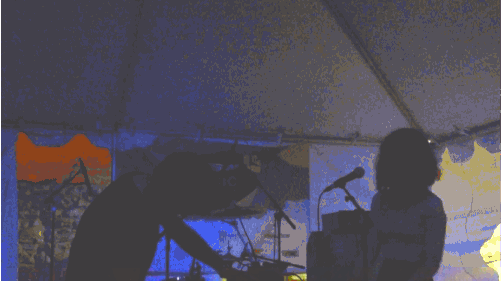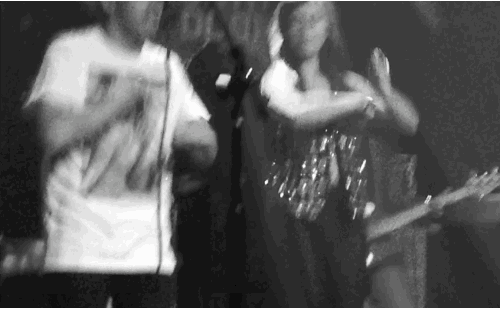
Text by Giovanni Guillén
Pictures by Daniela Galindo
Thursday night/early Friday had most of the CF-approved acts literally spread out all over Sixth Street, each featured in a distinct showcase. Here were some of the highlights.
8:07pm - Sobrenadar @ Vulcan Gas Company
As a project conceived at the height of the internet's chillwave obsession, Sobrenadar set itself apart with each release by taking a calmer approach than most of her other contemporaries. Knowing this beforehand, I was skeptical about how the live show would play out. During sound check, singer Paula García sported an alien sweatshirt

8:55pm - DESERT @ Esther's Follies
Running one block east I then made my way into Esther's Follies where Barcelona duo DESERT was already setting up. Being a cabaret bar, the stage faced a seating area which made for a slight awkward viewing experience. Then Cristina Checa and Eloi Caballé got started- slowly unleashing a mix of eerie percussion and beats that I can only compare to Blue Hawaii and the Pional remix of your dreams. If past songs like "Camins" were about looking for a way to the light, the new tracks not only celebrate its discovery, but also resolve to inhabit it. During their performance it also became clear how temporal pop forms no longer interests them, at least not live. In 20 minutes I only counted three distinct tracks, but it was enough to feel blown away. Let it be said now so that a future "I told you so" will be warranted: if Desert wasn't already on y'alls radar, that needs to change.
9:25pm - SVPER @ Palm Door on Sixth
Skipping out of DESERT's set a few minutes early, I arrived at Palm Door (across the street...) just as SVPER was launching into new material (this was also the day "Nuevo Cisne de Piedra" dropped so I can only assume that was what was playing). While squeezing through the crowd for a closer spot, I also got the sense of just how many people must've been anticipating their performance, especially from the row of giddy faces head bobbing up front. Sergio and Luciana no doubt picked up on as these vibes when they took us back to 2011 with their still-rousing singles "La melodía del afilador" and "El final de la noche," utilizing every synth-powered decibel to transform the tiny patio into their own arena-sized show.
11:00pm - Univers @ Soho Lounge
Even with the unforeseen line-up change, Univers managed to kick off their North American tour at Soho Lounge in high spirits and high volume. Considering their innumerable shoegaze and noise-pop references, it's a mystery how this band can exude the kind of freshness they do; of course, that was hardly on my mind as the show started because I was more affected by those guitars (which I hope no one vined) that barely let up throughout the entire set. Songs included "Cavall Daurat" and "Paral-lel" while most of the set was taken from their recently released debut album L'Estat Natural. The rest of the audience i'm assuming had a similar response as each song drew in a bigger crowd, attracting everyone from goths (or maybe just punk weebawoos), drunk old people, and even had fellow compatriots SVPER and DESERT watching. Classic night.















 GG: So, you're also trying to introduce him to another generation?
GG: So, you're also trying to introduce him to another generation?

 After enco
After enco



 After feeling out the crowd for the first few numbers (thou
After feeling out the crowd for the first few numbers (thou









